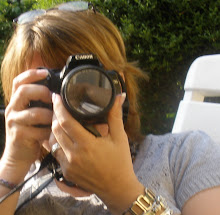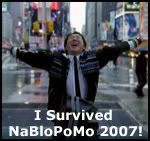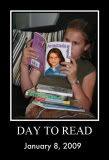affirmative
I work in an International School. Daily, I am surrounded by multiple languages. I communicate in two.
I communicate well in only one.
As English is the working language of the school community, I conduct most business in person and by phone in my native tongue. Sometimes I forget that it is not the native tongue of everyone in my community.
Part of the variable every-day-is-a-new-adventure job I do is to coordinate the door to door mini bus service of the school. As applications arrive, I process the information and liaise with the taxi company that provides the vans for our "bus" system. Currently, we are in process of a new sort and so it has come to me to call the applicants who have moved up the queue and will be given a seat on the bus. The question/answer session generally consists of me telling them that their application has been processed and their place approved, and would they like to accept this spot in the service on this date specific? They then answer yes or no and we move forward from there. Or the application stops.
Simple.
Kind of.
As I spat out my speech today, reached the end and managed the perfunctory pause to hear the answer to my question, I was met by audible hesitation, and then a single word reply. YES. But the inflection on the statement was unmistakably a question: YES?
And in a moment it was all perfectly clear to me.
I know the sound of this YES.
This YES? that means 'I think I gathered about 25% of what you've just blathered at me, and I can tell from this pause in conversation that it is my turn to speak and the best response at this moment, just might be YES so I am going to throw it in there and hope that you won't start sputtering more rapid fire conversation at me before my brain can process what you've just said and what I have in essence agreed to since I have now uttered a positive pronouncement to your question, which I think was indeed a question, but I can't be certain since I actually, in truth and honesty, have absolutely no idea what you are saying.'
I have used it before.
The day to day reality of speaking Dutch is at best an exercise in futility. I have mentioned before the fact that the Dutch are incredible linguists and most speak not only fluent English, but also at least one or two (or three, four or five) other languages in addition to their own Mother Tongue. Because they are such excellent English speakers and because the accent of an English speaker on the Dutch is so obvious, the most likely scenario in conversation with a Dutchie is that s/he will switch to English to carry on the conversation with ease. I always, always let that happen, because, well, I am just that lazy. So, while I can speak Dutch I am far from fluent, and the bottom line here is I probably will never be. Simply because I don't have to be.
Lest you get the wrong impression of me, please rest assured that I do try mightily to speak the language of my host country and I do study it and engage in (albeit simple) conversation as often as I can. The payoff for my effort is that my receptive skills are strong, and while I cannot prattle with proficiency, I can listen with comfort. Most of the time.
My position however is unique in that I am an English speaker. And that alone makes my experience as an expat in this country entirely different from many who travel here; those for whom learning at least one if not both of the dominant languages of this country is imperative. Like some friends we had in Leiden, who came from Russia (they have since returned to their home country) for whom the negotiation of all things Dutch was next to impossible until they mastered a common language. And people like the woman on the phone today who is working hard, exponentially harder than I have to work, and grappling with a language that is not her own in order to communicate.
People like that impress me deeply.
The phone conversation today really taught me something. Perhaps the lesson is an obvious one, but that doesn't make it any less an epiphany for me. Knowing that I needed to repeat my message caused me to simplify my sentences, to pull back on the rapid fire delivery and in every way possible to SLOW DOWN. And slowing down in that single conversation, taking that breath as it were, made me step back and consider just what it is I do and am doing.
And just how much I like it all, my life.
And maybe, just maybe, how I sometimes rush through it all a little too fast.
I liked that moment of fresh air and deep breathing and I think I should very much like to find that same kind of moment tomorrow, and the day after that, and the day after that too. Because I don't know everything, and sometimes I only understand some things. But all of the time, I know I am alive, and here, and happy.
And that, friends, is worthy of affirmation.










































No doubt! Life has presented you with an incredible opportunity living abroad. Stop and smell the tulips, as it were.
ReplyDeleteBTW I know that "yes" all too well and have used it many a time. You cracked me up with your description of the meaning.
No doubt! You are living in an incredible realm of opportunity. Stop and smell the tulips, as it were.
ReplyDeleteBTW, I know that "yes" oh so very well. lol Your description of the meaning cracked me up. :)
Oh, yes!
ReplyDeleteGood story: I always try to remember that there are two sides to the communication effort. It's forced me to be much more attentive to people when they speak english because I know they are making a special effort to accomodate me. My relocation contact was always fond of reminding me that while I'm adjusting to them, they are also having to adjust to me.
ReplyDeleteYES?!?!
ReplyDeleteThere is so much about your story that I relate to
...except I don't work for an international school
...and I only know 50 words in my host country
but I hope to get to where are you are in this new adventure!
I can fully relate to what you're saying, both from the speaking in different languages difficulty and needing to slow down and savor the small things.
ReplyDeleteI admire that you took the time to notice how you can rectify the situation. Too often, those in your situation would blame the person on the other end for "not being smart enough to know better."
What a wonderful post, Jenn. I'm glad you had that experience, and I'm glad that the woman got you on the phone, who was able to recognize her difficulty.
ReplyDeleteYes?
ReplyDeleteWell presented post! That you were sensitive enough to pick up on that "question" within the positive response--shows you're a sensitive soul right there. Many would have just blathered on.
ReplyDeleteAnd your ending realization of appreciating, even the small daily things, allowing them their "time"--priceless aha moment. Thanks for sharing.
I just LOVE the full paragraph description of the "yes" you heard. Just LOVED it.
ReplyDeleteYou are so right! It's easy to rush. I often convince myself that I HAVE to rush, and that by jamming so much in, I am living. I am productive! But I find, again and again, that keeping up with that pace sucks the life right out of me.
ReplyDeleteI echo Desert Songbird's comment: I admire that you took the time to notice how you can rectify the situation. Too often, those in your situation would blame the person on the other end for "not being smart enough to know better."
I recently stood in line behind a Spanish-speaking customer at a local store. He was desperately trying to learn about purchasing a calling card, that much I could gather, and the cashier did not understand. Even after pulling out a book and pointing at various pictures, the cashier wasn't able to answer the man's question. It was a tense moment as the line was growing longer and the cashier repeated louder and louder, "I DON'T KNOW WHAT YOU'RE SAYING!" Finally, the man made a "forget it" gesture and left. The cashier began to ring up my items and said to me, "I don't know why they just don't learn English. Where do they think they are, anyway?" I was speechless. It left me with such a bad feeling.
Good post.... (((HUGS)))
ReplyDeletegreat post. I often find myself having to communicate across various languages and it really does force us all to slow down so we can understand one another. our vocabularly level gets down to basic. sometimes involving charades. it can funny.
ReplyDeleteand as for French, when I don't know what someone is saying I say "vraiment?" a lot. as in "really?". works for just about anything!
Ahhh - welcome to the time-to-down-shift club!!!! As you may recall, that was my new years epiphany!
ReplyDeleteWelcome and I wish you an easier time of it than I appear to be having!! You would think we could all just slow down with ease - and yet . . . SIGH!
your description of "Yes!?" really nailed it! I remember trying to grasp any other language, (and sometimes even Dutch, as my first language is Achterhoeks) and that yes is something I used a lot! :D
ReplyDeleteHeh, when Hans and I went to Amsterdam last weekend I was sooo jealous of you! All I could think was, "It must bo so nice to be able to move to a foreign country and not ahve to learn the language right away."
ReplyDeleteOver here in Flanders English is the third or fourth language they learn. Dutch and French are the main ones. I've found some people who speak almost perfect english and some who I have to repeat myself, hand gesture and throw in some of the Dutch and/or French that I know to be understood. I've only been here a month and I think, being so immersed in Dutch will help me learn it a lot faster, and I know enough French that often I can fill in some of the blanks, but it felt so good to my ears to hear and read the English in Nederland.
Thanks for sharing...this is an eye openeer for me...I speak English most of the time...even at home...and I most of the time...tend to talk fast in rapid English...especially at work presuming people are more than comfortable with it...yet...I get blank looks at times...and oh, that YES!
ReplyDeleteNow I know better what to do next time...
I remember learning that many times people will speak louder when someone doesn't understand them instead of just speaking slower. I wish I spoke another language. I took Italian in college and Spanish in high school, but I don't remember much of either of them.
ReplyDeleteYes?
ReplyDelete:-)
Loved this...
Came here randomly, I lived in Friesland for a year and I know that "ja" all too well!
ReplyDeleteIt is so easy to use English in NL, which is why- despite the isolation of it- I'm glad I was in the middle of nowhere, even if I had to learn Dutch & Frisian. The only times I heard English were in Amsterdam and Leiden and it was always amazing!
Props for at least using Dutch for some of the time; makes Americans look better in general. And that is something we need!